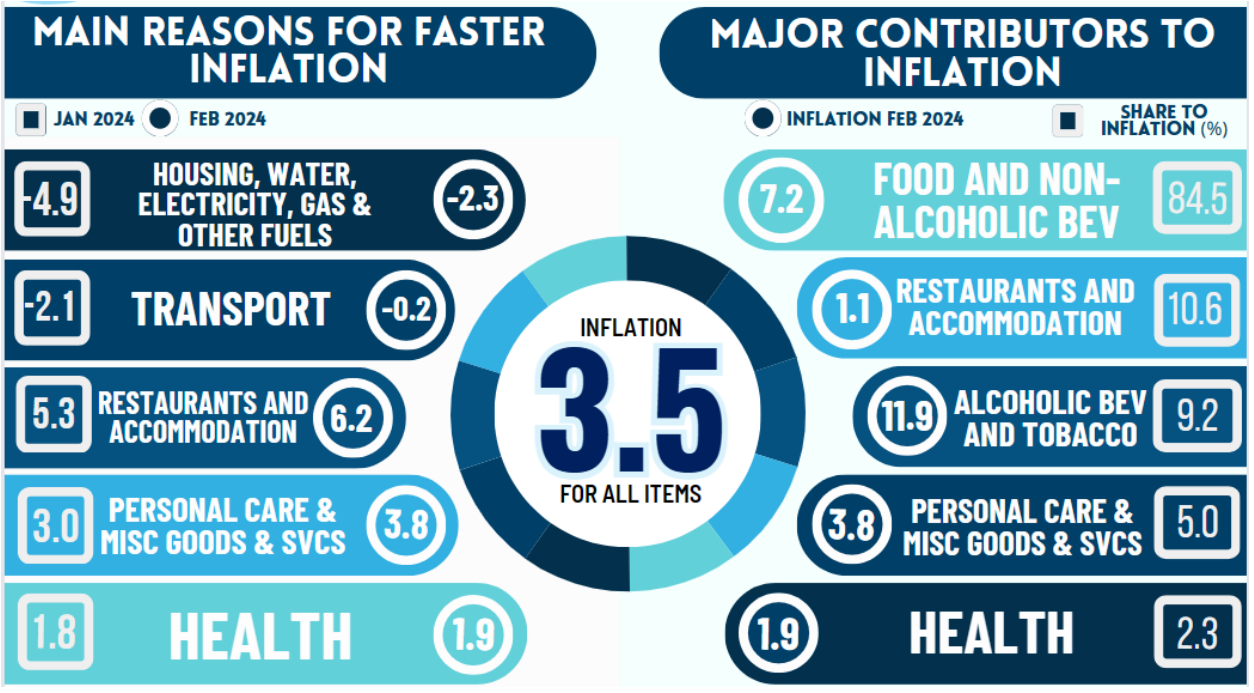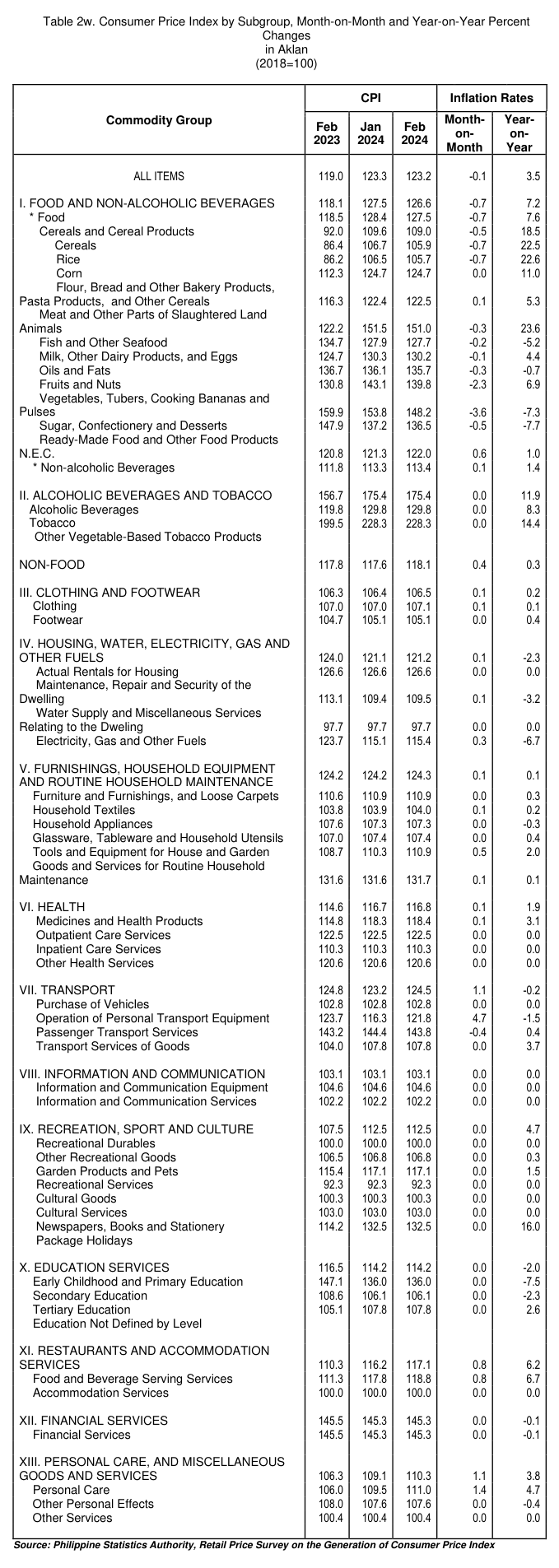Year-on-Year Inflation

In January 2024, the headline inflation in Aklan grew at a faster rate of 3.5 percent compared to the 3.0 percent recorded in the previous month. However, this reflects a notable decrease of 4.6 percentage points from the 8.1 percent inflation observed in February 2023. Aklan's inflation rate exceeds both the national and regional rates, standing at 3.4 percent and 2.7 percent, respectively.

Among the major commodity groups, the primary factor contributing to the uptrend in inflation this month among major commodity groups was Housing, Water, Electricity, Gas and Othe Fuels, registering an increase from -4.9 percent in January 2024 to -2.3 percent this month. It was observed that Electricity mainly brought the faster inflation of Housing, Water, Electricity, Gas and Other Fuels, showing an increase from -20.0 percent in January 2024 to -7.8 percent inflation in February 2024. Following this, Transport displayed an increase in inflation from -2.1 percent in the previous month to -0.2 percent in February. Additionally, Restaurants and accommodation services increased from 5.3 percent a month ago to 6.2 percent reported this month.

Other major commodity groups also contributed to the uptrend of the province’s inflation rate in February 2024:
a. Personal care, and miscellaneous goods and services, 3.8 percent;
b. Health, 1.9 percent; and
c. Clothing and footwear, 0.2 percent.
Inflation of the rest of the major commodities either decline or remained stable in February 2024 from January 2024.
Moreover, among the food commodities, Vegetables, tubers, plantains, cooking bananas and pulses mainly brought the uptick in inflation, having -20.8 percent inflation in January 2024 to - 11.0 percent in February 2024. Subsequently, inflation of Meat and other parts of slaughtered land animals also increased with -0.7 percent in the past month to 0.7 percent during the reference period, while, inflation of Cereals and cereal products, particularly, Rice, increased from 22.6 percent to 23.7 percent inflation in a month’s period.
Major Contributors to Inflation
The overall inflation of Aklan was mainly brought by price hike of Food and Non-Alcoholic Beverages which recorded 7.2 percent inflation with 84.5 percent share to overall inflation. This was followed by Restaurants and accommodation services at 6.2 percent inflation with 10.6 percent share to inflation, and Alcoholic beverages and tobacco with 11.9 percent inflation and 9.2 percent share to inflation.
Other major commodity groups also contributed to the province’s inflation rate in February 2024:
a. Personal care, and miscellaneous goods and services, 3.8 percent inflation with 5.0 percent share; and
b. Health, 1.9 percent with 2.3 percent share.
Purchasing Power of Peso

The purchasing power of peso (PPP) is inversely associated with inflation, which implies that as inflation increases, the purchasing power of peso decreases.
PPP in February 2024 was valued at 81 centavos, lower than 84 centavos recorded PPP in the same month last year.
This indicates that a 1000-peso worth of goods and services bought in 2018 will require a person
an additional P232.00 in order to buy them in February 2024.
Moreover, 7.6 percent inflation in food commodities results in an additional P275.00 this February
2024 in order to buy the same basket of food commodities worth P1000.00 in 2018.

EXPLANATORY TEXT
Consumer Price Index (CPI) - is an indicator of the change in the average retail prices of a fixed basket of goods and services commonly purchased by the households relative to a base year. It shows how much on the average, prices of goods and services have increased or decreased from a particular reference period.
The CPI Report was derived from the results of the 2018-based CPI survey comprised of thirteen (13) major commodity groups. These are the following: Food and Non-alcoholic Beverages; Alcoholic Beverages and Tobacco; Clothing and Footwear; Housing, Water, Electricity, Gas and Other Fuels; Furnishings, Household Equipment and Routine Maintenance of the House; Health; Transport; Information and Communication Services; Recreation, Sport and Culture; Education; Restaurants and Accommodation Services; Financial Services; and Personal Care and Miscellaneous Goods and Services.
Inflation rate is defined as the annual rate of change or the year-on-year change in the CPI.
Purchasing power of peso is a measure of the real value of the peso in a given period relative to a chosen reference period.
Market basket is a term used to refer to a sample of goods and services that are commonly purchased and bought by an average Filipino household.
Base period or Base Year is the period, usually a year, at which the index number is set to 100. It is the reference point of the index number series. In this report, 2018 is used as
the base period.
ENGR. ANTONET B. CATUBUAN
Chief Statistical Specialist

